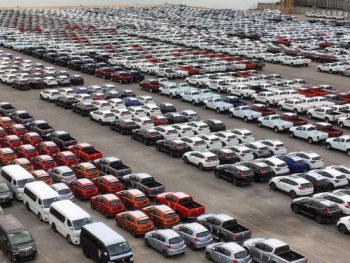The UK’s new LCV market declined 23.0% in June, ending a challenging first half on the back of continued supply shortages.

A total of 26,443 units were registered last month, according to new figures from the Society of Motor Manufacturers and Traders (SMMT), with falls in registrations seen across all segments. Some 20,449 vans weighing above 2.5 tonnes and up to 3.5 tonnes joined UK roads in the month, down 16.3%, while the number of lighter vans in the 2.0 tonnes or less segment fell by 30.7%. Vans of over 2.0 tonnes and up to 2.5 tonnes dropped by 43.7%.
The first-half figures also make for bleak reading. Some 144,384 new vans, pickups and 4x4s were registered in the first six months of 2022, down by almost a quarter (24.6%) compared with the same period last year, amid the ongoing global supply chain shortages.
The half-year decline was particularly exacerbated by comparison with 2021, which saw the third-best start to a year as pent-up demand for online delivery vehicles and a bounce-back in the construction sector boosted registrations.
But the market is also 26.5% below pre-pandemic levels – despite robust demand – due to the components shortages that have impacted deliveries and lead times.
Take-up of battery electric vans (BEVs) continues to rise though. June registrations were up 52.4% to 2,015 units – and first-half registrations totalled 8,100 units, a 60.0% increase on the same period last year.
But although 2022 has seen a raft of electric van model launches, BEVs still represent only one in 13 new van registrations in the UK this year.
And the SMMT continued to stress that action is urgently needed to boost consumer confidence and ensure uptake is at the speed required for a successful transition by the 2030 ICE ban.
It’s specifically calling for bespoke commercial vehicle charging infrastructure “built ahead of need” and situated in all regions of the UK, along with continued incentives for electric van buyers.
Mike Hawes, SMMT chief executive, said: “While electric vehicle registrations are growing in response to an ever-wider choice of plug-in models, a successful transition means accelerating uptake at pace, and this task could not come at a more difficult time.
“With inflation and energy costs hitting the pockets of UK van buyers, as well as the industry, operators need to be assured that charging infrastructure can meet their needs and that fiscal and grant incentives are in place for the long term.”

